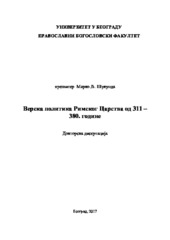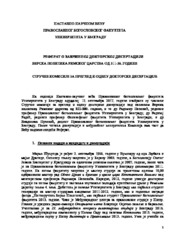Приказ основних података о дисертацији
Верска политика Римског Царства од 311-380. године
Religious policy of the Roman Empire 311-380 A. D
| dc.contributor.advisor | Popović, Radomir V. | |
| dc.creator | Šukunda, Marko | |
| dc.date.accessioned | 2019-01-25T15:28:13Z | |
| dc.date.available | 2019-01-25T15:28:13Z | |
| dc.date.available | 2020-07-03T09:08:44Z | |
| dc.date.issued | 2018-01-29 | |
| dc.identifier.uri | https://nardus.mpn.gov.rs/handle/123456789/10662 | |
| dc.identifier.uri | http://eteze.bg.ac.rs/application/showtheses?thesesId=6524 | |
| dc.identifier.uri | https://fedorabg.bg.ac.rs/fedora/get/o:19279/bdef:Content/download | |
| dc.identifier.uri | http://vbs.rs/scripts/cobiss?command=DISPLAY&base=70036&RID=50922767 | |
| dc.description.abstract | У раду се бавимо верском политиком царева у Римском царству почевши од цара Галерија и његовог издавања едикта 311. године, који претходи Миланском едикту и даје слободу хришћанској вери, па све до 380. године када цар Теодосије I Велики издаје чувени едикт cunctos populous, којим хришћанство постаје главна вера у Царству. Верска политика царева се превасходно проучава на основу конституција које се налазе у зборнику закона Codex Theodsianus, који се везује за име цара Теодосија II Млађег. Рад је подељен на шест целина, да би се на што прецизнији и свеобухватнији начин сагледала царска политика. У првом делу, под називом Духовне и политичке прилике у позном Римском царству, се даје контекст у којем су закони настајали као и верска кретања и проблеми који су пратили цареве законодавце, почевши од времена пре цара Константина Великог па све до смрти Теодосија Великог. Управо због великог временског периода који обухвата, ова целина је садржајно и најопширнија. Друга и најважнија целина под називом Верска политика римских царева: Закони који се односе на Цркву и хришћанство, тиче се хришћана и свих повластица које су им цареви одобрили. Она почиње издавањем Галеријевог едикта који хришћане ставља под окриље закона, а завршава законом cunctos populous, који хришћанству даје статус државне вере и указује на који начин сви треба да верују. У трећем делу, под називом Негативне последице привилегија и закони о јеретицима, аутор говори да нису све повластице биле на корист Цркви, позивајући се на јеванђелску максиму: све вам је дато, али вам није све на корист.(1Кор 6, 12) Црква се није одмах најбоље снашла у новонасталој ситуацији и све привилегије које је добила нису јој увек ишле у корист, што је створило много унутарцрквених проблема. Када више нису имали спољашњег непријатеља (Царство), хришћани су се окренули међусобним проблемима. Управо из тог разлога су цареви морали да издају законе против разних црквених девијација и ставили су се у улогу заштитника Цркве, а све због очувања мира у Царству. У четвртој целини, под називом Закони о Јеврејима, се говори управо о промени начина размишљања световних власти. Наиме, у првим вековима цареви су прогонили хришћанство, док су Јевреји уживали одређене привилегије које су добили на основу 6 своје посебне религије. Како је време одмицало однос снага у Царству се променио и Јевреји су дошли у незавидан положај. Од потпуно повлаштене религијске групе они су дошли на руб егзистенције. Ово је пре свега било јер су од почетка били велики непријатељи хришћана будући да су они разапели Христа. Ово никада није заборављено и хришћански цареви су издавали, поред малобројних привилегија, законе који су их у потпуности гурнули на маргине друштва. Пета целина носи назив Закони о паганима и она наставља да говори о другим религијама у Царству. Паганство је било традиционална римска религија и читав државни систем се на њој темељио више векова. Међутим, променом духовне климе и доласком цара Константина ствари се на духовном плану мењају. Паганство од званичне религије Царства полако почиње да се гура на маргине римског друштва и како време одмиче, оно добија све више забрана од стране царева који су били наклоњени хришћанству. Посебно је дирљива прича коју детаљно наводимо у раду о олтару Победе који је царским указом уклоњен из Сената, јер је нарушавао хришћанска начела која су завладала. Последње поглавље, Стављање ван снаге закона који су доношени под тиранима и варварима се природно надовезује на законе о паганима, али је стављено засебно, зато што говори о свести хришћанских царевa. Ови владари се називају и погрдним називима у Теодосијевом кодексу, јер се толико променила духовна клима, а њихов духовни компас је изгубио путоказ, да су они који су наставили да заговарају паганство у време хришћанске доминације и зато их законодавац назива „тиранима и варварима“. У закључним разматрањима аутор нуди критички осврт на читав овај турбулентни период и посебно наглашава да су закони, као примарни извор проучавања царске религијске политике област која заслужује већу пажњу, јер сведочи о вери царева који су били истински верници, а притом и мудри државници | sr |
| dc.description.abstract | In the paper we examin religious politics of emperors in the Roman Empire, beginning with Emperor Galerius and his publishing of the edict in 311 A.D., which precedes the Edict of Milan and grantsreligious freedom to Christians, and ending in 380 A.D. when Emperor Theodosius I issued the famous edict Cunctos populos, which proclaims Christianity to be the main religion in the Roman Empire. The emperors' religious politics is primarily studied based on the constitutions found in the Theodosian code (Codex Theodosianus), the compilation of laws related to emperor Theodosius II Junior. The work is divided into six chapters in order to comprehend the politics of the emperors in the most precise and comprehensive way. The first chapter, called Spiritual and Political Circumstances in the Late Roman Empire, offers the context in which all laws were created, as well as religious movements and problems which followed emperors’ legislators, beginning with the time before emperor Constantine the Great until the death of Theodosius the Great. Since this chapter covers a long period of time, it is the most extensive one in terms of content. The second and most important chapter called Religious Politics of Roman Emperors: Laws Referring to Church and Christianity is related to Christians and all the privileges granted to them by the emperors. This chapter begins with publishing of Galerius’ edict which legalized Christianityand ends with the law Cunctos populos, which made Christianity the official religion and stipulated how everyone should believe. In the third chapter, called Negative consequences of privileges and laws which refer to heretics, the author states that not all privileges were useful to the Church, referring to the evangelic maxime: I have the right to do anything, but not everything is beneficial. (1 Kor, 6, 12) The Church did not manage to find its feet in the new situation and not all the obtained privileges were useful, which caused a lot of problems within the church itself. When their outer enemy (the Empire) ceased to exist, Christians turned to their problems. That was the reason why emperors had to make laws against various deviations within the church and take upon themselves the role of the protector of the Church, so as to ensure the peace in the Empire. The fourth chapter,called Laws about the Jews, talks about the change in the way of thinking of the authorities. Namely, in the first centuries of Christianity, Christians were persecuted by the 8 emperors, while the Jews enjoyed some privileges granted to them on the basis of their special religion. As time passed, the circumstances in the Empire changed so the Jews found themselves in an unenviable position. Once a completely privileged religious group found itself on the verge of existence. This happened because they were greatenemies of Christians since they crucified the Christ. This had never been forgotten and Christian emperors, next to few privileges, made laws that pushed them completely to the margins of society. The fifth chapter is called Laws about pagans and it continues to talk about other religions in the Empire. Paganism was traditional Roman religion and the entire state system was based on it for centuries. However, things within the religious framework changed with the change of religious circumstances and arrival of the Emperor Constanine. Paganism, which had been the official religion of the Empire, was pushed to the margins of Roman society, and as time passed by, it received more and more prohibitions from the emperors who preferred Christianity. There is an especially touching story described in the paper, and it refers to the altar of Victory, which is removed from the Senate by the emperor’s decree, because it violated ruling Christian principles. The last chapter, which is called The repeal of lawsmade under the tyrants and barbarians, is naturally linked to the laws about pagans, but it is separated, because it refers to the conscience of Christian emperors. These rulers were given some pejorative names in Codex Theodosius, because the spiritual framework changed so much, and their spiritual compass lost its guidepost, and they continued to advocate paganism in the time of Christian dominance, which is the reason why the legislator calls them “tyrants and barbarians”. In concluding observations the author gives a critical review on this turbulent period and emphasizes that the laws, as the primary source of studying emperors’ religious politics, are the area deserving greater attention, since they testify about the faith of emperors who were genuine believers, but also wise statesmen | en |
| dc.format | application/pdf | |
| dc.language | sr | |
| dc.publisher | Универзитет у Београду, Православни богословски факултет | sr |
| dc.rights | openAccess | en |
| dc.rights.uri | https://creativecommons.org/licenses/by-nc-nd/4.0/ | |
| dc.source | Универзитет у Београду | sr |
| dc.subject | Римско царство | sr |
| dc.subject | Roman Empire | en |
| dc.subject | religious politics | en |
| dc.subject | emperors | en |
| dc.subject | Constantine | en |
| dc.subject | Theodosius | en |
| dc.subject | Church and privileges | en |
| dc.subject | Theodosian Code | en |
| dc.subject | laws | en |
| dc.subject | Jews | en |
| dc.subject | pagans | en |
| dc.subject | верска политика | sr |
| dc.subject | цареви | sr |
| dc.subject | Константин | sr |
| dc.subject | Теодосије | sr |
| dc.subject | Црква и привилегије | sr |
| dc.subject | Теодосијев кодекс | sr |
| dc.subject | закони | sr |
| dc.subject | Јевреји | sr |
| dc.subject | пагани | sr |
| dc.title | Верска политика Римског Царства од 311-380. године | sr |
| dc.title.alternative | Religious policy of the Roman Empire 311-380 A. D | en |
| dc.type | doctoralThesis | en |
| dc.rights.license | BY-NC-ND | |
| dc.identifier.fulltext | https://nardus.mpn.gov.rs/bitstream/id/14869/Disertacija.pdf | |
| dc.identifier.fulltext | https://nardus.mpn.gov.rs/bitstream/id/14870/IzvestajKomisije18869.pdf | |
| dc.identifier.fulltext | http://nardus.mpn.gov.rs/bitstream/id/14869/Disertacija.pdf | |
| dc.identifier.fulltext | http://nardus.mpn.gov.rs/bitstream/id/14870/IzvestajKomisije18869.pdf | |
| dc.identifier.rcub | https://hdl.handle.net/21.15107/rcub_nardus_10662 |



